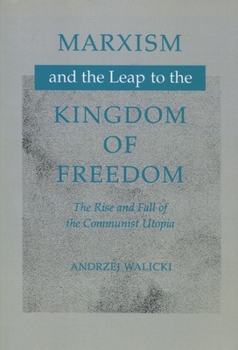Marxism and the Leap to the Kingdom of Freedom: The Rise and Fall of the Communist Utopia
Select Format
Select Condition 
Book Overview
The aim of this book is to carefully reconstruct Marx and Engels's theory of freedom, to highlight its centrality for their vision of the communist society of the future, to trace its development in the history of Marxist thought, including Marxism-Leninism, and to explain how it as possible for it to be transformed at the height of its influence into a legitimization of totalitarian practices. The relevance of the Marxist conception of...
Format:Paperback
Language:English
ISBN:0804731640
ISBN13:9780804731645
Release Date:September 1997
Publisher:Stanford University Press
Length:656 Pages
Weight:1.90 lbs.
Dimensions:1.5" x 6.0" x 9.0"
Customer Reviews
2 ratings
Antinomies of freedom and necessity
Published by Thriftbooks.com User , 22 years ago
This is the last of about ten Marx critiques that I read, if only because they often have facts unavailable elsewhere. After a while they are all the same, though not quite this one. Comparable to the work of Kolakowski in a perspective on Communism from the vantage point of those who lived this experience in Eastern Europe, this striking work is a reminder of the historical record, in four main stages, Marx, Engels, Lenin, and the totalitarian outcome, and a recommendable challenge to overconfident Marxist houdinis to release themselves from the bindings of confused enterprise, with a detailed history not available in most major propaganda versions. No fan of Marx, still, few come as close to the core of the strange Hegelian-Feuerbackian notion of 'self and species being' that animates the almost crypto-Upanishadic quality of this concept of man. This is genuinely obscure, and genuinely profound, and almost the mistake of presuming the noumenal, in the antinomy that lurks near the shipwreck of the 'realization of being'. The author wishes to explore Marx's conception of freedom, "a mode of existence in which humans are integrated and self-determining". One pauses, what's wrong there, this is the answer, no? It is factual to maintain that the form of economic society in question rarely releases the true self from the free economic agent. Here Marx's challenge to the future stands, irregardless, in the concealed tragedy of Hegelian slaughterbench teleology, unresolved in any philosophy. Perhaps it is the fuzzy undefined nature of the metaphyical basis that leads to the inexorable reversal and deviation from its initial conditions of the Movement, and the tale told is a gripping description of the stages of a tragedy, and the leap becomes a series of increasingly irrational circumstances, like a jacknifed truck in an accident. Beyond the questions of philosophy, the book is an excellent portrayal of the sheer Murphy's Law quality of group organizational tactics, reified ideologies, founders and disciples, philosophy versus scientism, and the seeming inevitability of the claim on the future to do anything but lose control. The tragic outcome of revolutionary logistics. One must differ from the author to a great degree, we cannot indict Marx for this complex outcome. We can see that the reification of this resolution of self and species being is apt to turn into something unforeseen. The 'authoritarian' Marx seems too much in evidence, where the democrat of the 1840's is struggling with the definition of terms. A critique of Marx, unless merely facile propaganda, must really engage the enemy, and risk uncovering more than a cardboard figue, and the real insight behind Marx's heroic gestures. The author invokes this Marx and raises his sword to slay the dragon, but it slips away, wounded, whether fatally remains unknown. Gripping tale in any case. Back to the beginning with the debugger.
Utopianism's Abuse of the Idea of Freedom
Published by Thriftbooks.com User , 24 years ago
This is a book on the theoretical aspects of communist totalitarianism, not its practical consequences, but this does not diminish its value or its readability. Walicki does a masterful job in showing how a totalitarian mind-set is the most logical outcome of Marx & Engels' redefinition of freedom as the supposed "freedom" of humanity as a whole, instead of individual liberty. In the name of putting these insane ideas into practice, Lenin was prepared to stop at nothing, launching wave after wave of terror, all the while deceiving himself that the terror was perfectly justified because the end result would be beneficial to mankind. Walicki bares all in this book, and demonstrates how Lenin adopted the NEP not to improve things by letting in a little reality, but grudgingly, in order to keep his utopian dream from collapsing. Such, the author points out, is the result of believing that history has immutable "laws" and that certain theorists have succeeded in unlocking their mysteries and thereby obtaining absolute truth, which cannot permit itself to be questioned.It's axiomatic that the most supposedly noble ideas typically have the most horrible consequences. Why? The more noble and beneficial the theory is, the more wicked its opponents will appear to be -- and what should done with wicked people?If you have a sweeping, grandiose idea about how to save the world, do everyone a favor and please keep it to yourself. If only Marx and Lenin would have followed this advice, the world would have been spared a lot of misery.





